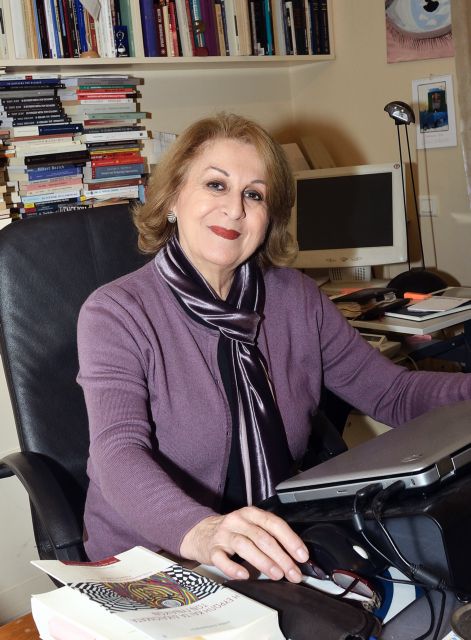Anna Karamano: The gender dimension is absent from Greek politics.

Anna Karamano
In Greece, women gained the right to vote and stand for election only in 1952. In Turkey, they achieved this earlier, in 1934.
Anna Karamanou
Europe and Women’s Rights:
Europeanization in Greece and Turkey – A Comparative Analysis
Papazisis Publications, 2015,
p. 711, price 33.92 euros.
In Greece, women only gained the right to vote and stand for election in 1952. In Turkey, this right was granted earlier, in 1934. Greece was ahead of Turkey by just 22 years in decriminalizing adultery, even though it had already joined the EU. In 1957, “the negotiation and signing of the Treaty of Rome was indeed the work of men, but it included an article on equal pay, which made the EU a key factor in shaping gender relations.” However, Greece in the 21st century ranks 91st out of 142 countries in the World Economic Forum’s global gender equality index. As Anna Karamanou writes, the data from 2014 “depict a country more like the Middle East than a member of the European Union.”
She herself, a woman with strong social and activist involvement, an admirer of Kallirroi Parren and contemporary Greek feminists with significant contributions, such as Aliki Giotopoulou-Maragkopoulou. and the Margarita Papandreouserved as the president of the Women’s Rights Committee in the European Parliament, where she was a member of the Socialists from 1997 to 2004. The book she wrote is based on her doctoral thesis, the first in Greece that combines (through History, feminist theory, and primary research) gender studies with international studies: for example, the archetypal model of Lysistrata with the peace-loving dimension of her theory. soft power (softpower).
It is essentially a comparative study of gender relations in the political and social modernization process of Greece and Turkey. Anna Karamanu, with whom “To Vima” spoke, argues that gender equality – not only de jure, which has largely been achieved and is important, but also de facto, which remains a goal – constitutes the depth and essence of the democratic functioning of the political system and society, of justice and citizenship, and ultimately the measure of cultural progress.
She draws a parallel between Greece and Turkey. “Although the two countries have different starting points and histories, they share many similarities in terms of clientelist relationships, delayed economic and social structures, democratic deficits, patriarchal/ Mediterranean/Balkan culture, and the deep influence of religion.” So? «The Ottoman legacy, as much as some of us try to exorcise it, remains strong. We coexisted for 400 years, let’s face it. As the proverb says, if you sleep crooked, you’ll wake up cross-eyed. If we don’t get rid of the last remnants, we won’t see progress. “Anna Karamanou emphasized.”
“The role of the Church”
«In our country, I have the feeling that the Greek Orthodox Church has played a very negative role. Something that has not been adequately researched, we do not know to what extent its role hinders the development of a country. The Greek Orthodox Church has never been willing to support women’s rights and gender equality. It is a backward organization that, by definition, excludes women. Even in the clergy, in any case, there could be positions of responsibility and work for women. In the priesthood, I believe we would have had impressive renewal and healthier spirituality. I will not even revisit the scandal of the Athos Monastery’s ban on women! The Greek Orthodox Church has always remained hostile and unyielding, unlike other Christian denominations, such as the Protestant one, which opened up to social development and recognized it».
Not that Islam in Turkey (where today the hijab has returned to normalcy) differs much in this regard. The neighboring country started well but is now experiencing a tremendous setback. «The main difference in the early 20th century was that Kemal had unlimited powers, imposing modernization and Europeanization from above (along with a “state feminism”). Atatürk was obsessed with education, building schools on a large scale and encouraging women to attend them. The percentage of women attending schools was higher in Turkey at the time compared to Greece. Venizélos, despite being a Europeanist and open-minded, and despite granting women the right to vote in the end, had limited powers and acted in an unstable political environment, taking into account the political cost. For example, one can refer to the speeches of male parliamentarians of the time, who would belittle, disdain, and mock the women who were demanding equal rights.».
This claim was activated earlier. «Rigas Velestinsis’ pioneering ideas and his influence on the position of women have been overlooked to this day. At a time when even during the French Revolution women’s equal rights had not been recognized, he argued that boys and girls should receive the same education, and that girls should carry weapons if they are able and when necessary. I believe it was Rigas who inspired Greek women to participate in the 1821 Revolution, despite the fact that after the Liberation, patriarchal structures once again confined them to the home! I would remind you that Olympia de Gouges was beheaded by the French revolutionaries for daring to demand equality. ».
It must be understood, concluded Anna Karamanou, that “the feminist revolution was carried out by a handful of educated women in both Greece and Turkey, who stepped forward and forced male politicians to legislate,” something we must remember because “the gender dimension is still absent from political practice in Greece even today.“
The book will be presented on Monday, March 7th at 12:00 PM in the event hall of the IANOS bookstore in Athens (Stadiou 24). Speakers: Thanos Veremis, Marietta Giannakou, Anna Diamantopoulou, Panagiotis Ioakeimidis. The event will be moderated by Katerina Daskalaki and the introduction will be given by Sotiris Ntalis.